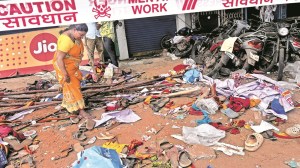110 Afghans killed by cold in one night
JAN 31: The United Nations said on Wednesday more than 110 Afghans displaced by drought and war died from cold in one city in one night.&q...

JAN 31: The United Nations said on Wednesday more than 110 Afghans displaced by drought and war died from cold in one city in one night.
"Temperatures in the western provincial capital city (Herat) fell to as low as -25 (degrees Celsius)" on Monday night, the UN Coordinator’s office for Afghanistan (UNOCHA) said in a statement.
It believed the main victims were women and children. "With vehicle engines frozen, movement of aid workers to the camps has been impeded," it added.
There are about 80,000 displaced people in six camps outside Herat city and UNOCHA said five were already full. Some 300 to 500 displaced people had arrived in Herat each day since the middle of last month.
"The drought currently affecting Afghanistan has put at risk the lives of approximately 50,000 families (300,000 people) in the western region.
"The area of distress is now starting to enlarge and reports are being received of displaced persons moving to other areas of western Afghanistan in search of assistance," it added.
UNOCHA said that since the middle of last year more than 500,000 Afghans had left their homes, most moving elsewhere inside Afghanistan.
But more than 100,000 people from northern Afghanistan had moved to Pakistan in the last four months seeking refugee status and shelter, straining resources of UN relief agencies.
UNOCHA said due to a poor response to funding requests by the donor community, conditions in the camps were bad.
An emergency appeal this month for $3.5 million for non-food items has received commitments of only $200,000. UNOCHA reported critical shortfalls of all non-food items, including blankets, tents, quilts and other supplies.
The UN World Food Programme said in Kabul on Tuesday it was running out of food for Afghanistan. The WFP appealed to foreign donors for another 177,000 tonnes of food worth $87 million to feed 2.4 million of the most hungry and poor.
UNOCHA said it feared displacement would continue inside the country and across international borders for several more months, requiring crucial food and non-food aid.
"These needs will be compounded in view of the dismal economic situation in many urban areas, the non-availability of wage labour, and the severe decline in wage labour rates far below subsistence level," it added.





- 01
- 02
- 03
- 04
- 05


























